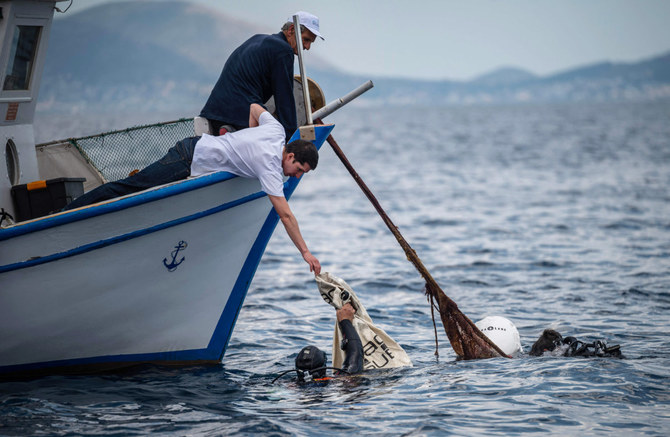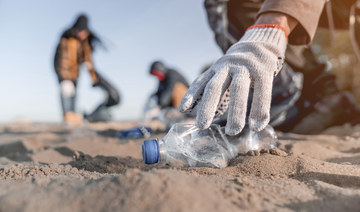KERATSINI, Greece: The fish market of Keratsini, west of Athens, is abuzz in the early morning, with trawlers disgorging crates of sardines and anchovies as trucks await nearby to be loaded.
But on his family’s fishing boat, Lefteris Arapakis sorts out a different sort of haul — bottles, boots, plastic pipes and fishing nets, all dragged from the bed of the Aegean Sea.
“We are swimming in plastic,” said Arapakis, whose family has fished for five generations.
By 2050 “there will be more plastic than fish” in the sea, he warned, quoting recent reports.
That morning’s plastic catch “weighs about 100 kilos,” said the 29-year-old economist and co-founder of Enaleia, an NGO that encourages fishermen to collect marine litter caught in their nets.
Since its creation in 2018, it has worked with more than 1,200 fishermen in Greece to raise awareness over the degradation of the maritime environment.
The seabed litter does not come only from Greece but from all over the Mediterranean, moving with the sea currents.
Active in 42 ports throughout Greece, Enaleia provides fishermen with large bags for marine waste that they can deposit in dumpsters once back at port.
For every kilo of plastic they deliver, they receive a small “symbolic” sum. The money is enough for a drink, said Arapakis, who was in Paris this week for global talks on limiting plastic pollution.
Representatives of 175 nations are meeting at the UNESCO headquarters with the aim of making progress toward reaching an agreement by next year covering the entire plastics life cycle.
Since October, fishing crews affiliated with Enaleia have dragged out 20 tons of plastic and old fishing equipment each month. Nearly 600 tons have been collected over the last five years, the NGO said.
The collected plastic is transported to a recycling plant in the industrial area of Megara near Keratsini, to be turned into pellets to make new products such as socks, swimwear or furniture.
A sixth is fishing nets, according to Emalia. Next in line are high and low-density plastics (12.5 percent and 8 percent respectively). But nearly half of the total, 44 percent, is non-recyclable plastic.
Recycling marine waste is a “challenge” because the plastic is degraded by its exposure underwater, said Hana Pertot, sales manager of the Skyplast recycling plant in Megara.
Enaleia began as a fishing school created by Arapakis after he lost his job in 2016 during the Greek financial crisis.
It was originally created to help his father recruit personnel for his trawler.
The organization is now also active in Italy, and this year began partnerships in Spain, Egypt and Kenya.
Arapakis said he embarked on the Mediterranean Cleanup project after a trip to Greece’s Cyclades islands, where he saw fishermen throwing the waste gathered by their nets back into the sea.
In 2020, the UN Environment Programme awarded Arapakis its “Young Champion of the Year in Europe” prize. He is convinced that there has been a “mentality change” among Greece’s fishermen.
Previously “we caught large quantities of plastic but we only kept the fish. All waste was thrown into the sea,” said Mokhtar Mokharam, the team leader on Arapakis’ family’s boat, the Panagiota II.
There are also practical benefits for fishing boats.
“In the past, the anchor often snagged on waste of all kinds, especially nets, and the engine would go out,” said Nikolaos Mentis, who works out of the island of Salamina opposite Keratsini, and has been an Enaleia contributor for the past five years.
“Fishermen are mobilizing, (it’s) a kind of democracy. Climate change mainly affects people on low incomes,” he said.
“Fishermen were part of the problem before. Now they are part of the solution — which means that any citizen or politician can contribute.”














